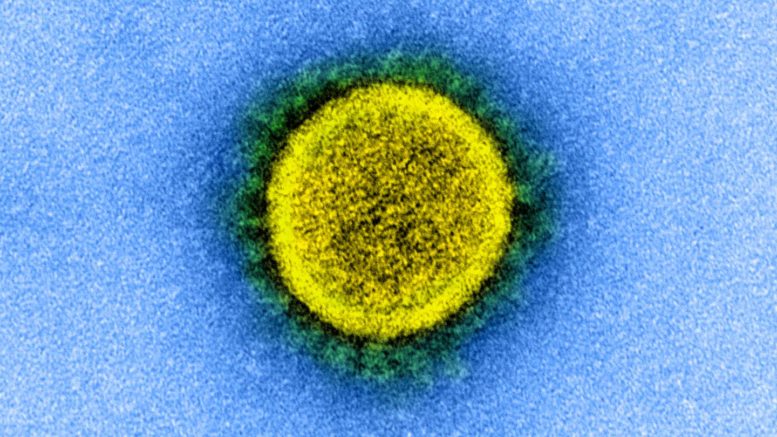More than 99.9% of seasonal coronaviruses present in airborne droplets were killed when exposed to a particular wavelength of ultraviolet light that is safe to use around humans, a new study at Columbia University Irving Medical Center has found.
"Based on our results, continuous airborne disinfection with far-UVC light at the current regulatory limit could greatly reduce the level of airborne virus in indoor environments occupied by people," says the study's lead author David Brenner, PhD, the Higgins Professor of Radiation Biophysics at Columbia University Vagelos College of Physicians and Surgeons and director of the Center for Radiological Research at Columbia University Irving Medical Center.
The research was published today in Scientific Reports.
Conventional germicidal UVC light (254 nm wavelength) can be used to disinfect unoccupied spaces such as empty hospital rooms or empty subway cars, but direct exposure to these conventional UV lamps is not possible in occupied public spaces, as this could be a health hazard.
To continuously and safely disinfect occupied indoor areas, researchers at Columbia University Irving Medical Center have been investigating far-UVC light (222 nm wavelength). Far-UVC light cannot penetrate the tear layer of the eye or the outer dead-cell layer of skin so it cannot reach or damage living cells in the body.
The researchers had previously shown that far-UVC light can safely kill airborne influenza viruses.
The new paper extends their research to seasonal coronaviruses, which are structurally similar to the SARS-CoV-2 virus that causes COVID-19.
In the study, the researchers used a misting device to aerosolize two common coronaviruses. The aerosols containing coronavirus were then flowed through the air in front of a far-UVC lamp. After exposure to far-UVC light, the researchers tested to see how many of the viruses were still alive.
The researchers found that more than 99.9% of the exposed virus had been killed by a very low exposure to far-UVC light.
Based on their results, the researchers estimate that continuous exposure to far-UVC light at the current regulatory limit would kill 90% of airborne viruses in about 8 minutes, 95% in about 11 minutes, 99% in about 16 minutes, and 99.9% in about 25 minutes.
The sensitivity of the coronaviruses to far-UVC light suggests that it may be feasible and safe to use overhead far-UVC lamps in occupied indoor public places to markedly reduce the risk of person-to-person transmission of coronaviruses, as well as other viruses such as influenza.
In a separate ongoing study, the researchers are testing the efficacy of far-UVC light against airborne SARS-CoV-2. Preliminary data suggest that far-UVC light is just as effective at killing SARS-CoV-2.
"Far-UVC light doesn't really discriminate between coronavirus types, so we expected that it would kill SARS-CoV-2 in just the same way," Brenner says. "Since SARS-CoV-2 is largely spread via droplets and aerosols that are coughed and sneezed into the air it's important to have a tool that can safely inactivate the virus while it's in the air, particularly while people are around."
Brenner continues, "Because it's safe to use in occupied spaces like hospitals, buses, planes, trains, train stations, schools, restaurants, offices, theaters, gyms, and anywhere that people gather indoors, far-UVC light could be used in combination with other measures, like wearing face masks and washing hands, to limit the transmission of SARS-CoV-2 and other viruses."
The paper is titled, "Far-UVC light (222-nm) efficiently and safely inactivates airborne coronaviruses." The other authors (all CUIMC) are Manuela Buonnano, David Welch, and Igor Shuryak. The study was funded by the Shostack Foundation and the NIH (grant R42-AI125006-03).
The authors declare that the Trustees of Columbia University in the City of New York have a pending patent on the technology: "Apparatus, method and system for selectively affecting and/or killing a virus."
Source: Columbia University Irving Medical Center

Thank you for any other wonderful article. Where else may just anyone get that kind of information in such a perfect way of writing? I have a presentation next week, and I am at the look for such information.
Fine way of describing, and nice post to get information regarding my presentation subject, which i am going to deliver in college.
Because the admin of this site is working, no doubt very rapidly it will be famous, due to its quality contents.
Have you ever considered about including a little bit more than just your articles? I mean, what you say is fundamental and all. Nevertheless think about if you added some great graphics or video clips to give your posts more, “pop”! Your content is excellent but with images and video clips, this website could undeniably be one of the most beneficial in its niche. Good blog!
Oh my goodness! Amazing article dude! Many thanks, However I am experiencing problems with your RSS. I don’t know why I am unable to subscribe to it. Is there anybody else getting the same RSS problems? Anyone who knows the solution will you kindly respond? Thanx!!
always i used to read smaller posts which also clear their motive, and that is also happening with this article which I am reading at this time.
Hello there, just became aware of your blog through Google, and found that it is really informative. I’m gonna watch out for brussels. I will appreciate if you continue this in future. Many people will be benefited from your writing. Cheers!
I constantly emailed this weblog post page to all my friends, as if like to read it next my links will too.
Asking questions are actually good thing if you are not understanding anything entirely, except this post provides pleasant understanding even.
Hi there! I just want to give you a huge thumbs up for the great info you have here on this post. I’ll be coming back to your site for more soon.